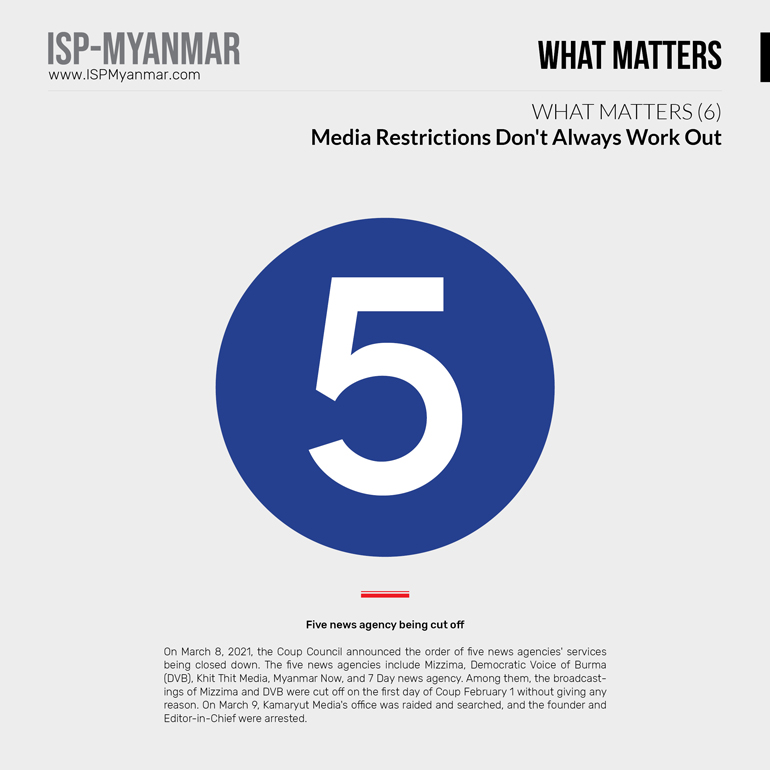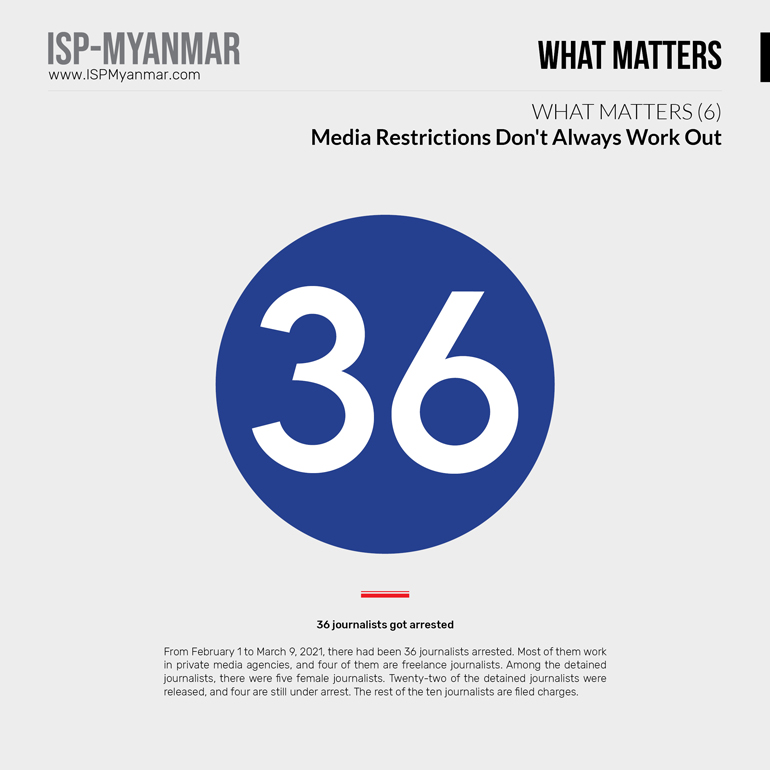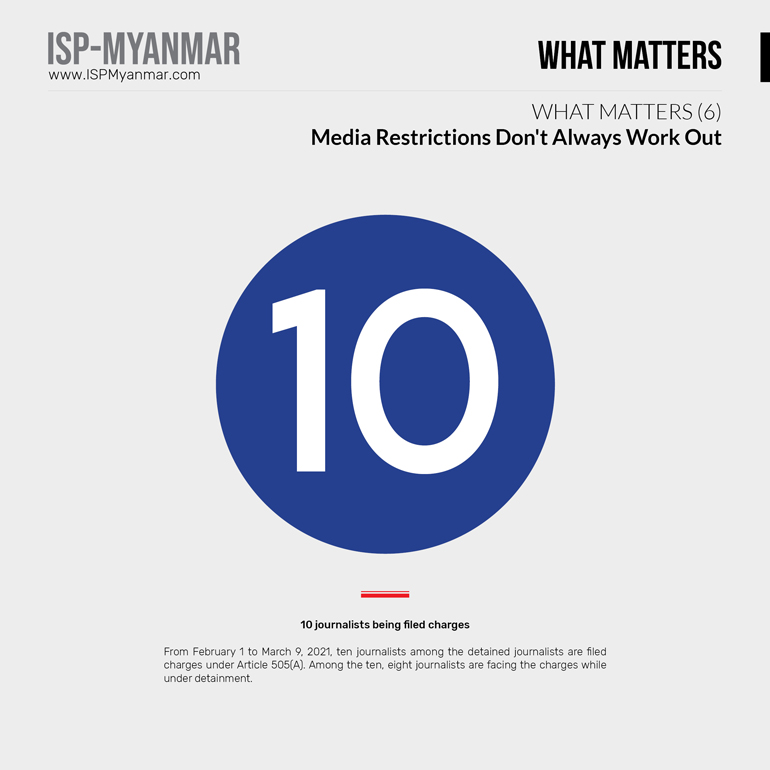(The original Burmese version was published on the ISP-Myanmar Facebook page on March 10, 2021.)
Since the February 1st military coup, freedom of expression and the private media in Myanmar have been subjected to the threats of legal repressions unfairly imposed by the military junta. In an effort to legitimize the coup d’état, the Security Administrative Council (SAC) has engaged in several forms of repressions.Since the coup d’état, the military closed down two private television stations, and it has continued to arrest journalists reporting on the anti-coup protests and investigating the injustices committed by the authorities. Since then, the junta also has shut down two more private TV broadcasting channels, a news agency, and two digital news outlets. At the same time, the SAC also controls the public’s access to the internet by shutting it off at nighttime. In light of the current situation, the ISP–Myanmar presents the article titled “MediaRestrictions Don’t Always Work Out”.
∎ Executive summary
During coup d’états, military dictatorships have employed different measures to restrict media freedom. On the other hand, restrictions on media freedoms do not always succeed.
Adam Bourgault, a renowned researcher of media freedom under authoritarian regimes, identifies four factors crucial for the success or failure of efforts by authoritarian regimes to restrict the media. These are:
- Centralization of power – the ability of the junta to centralize the power and possess the coercive capacity to effectively enforce its rules
- Cultural values on privacy and control – cultural values and traditional norms of the society regarding the concept of freedom of expression
- Access to information technology – the accessibility of private citizens to the information technology
- Private, professional journalism – the quality of the media’s professionalism during the post-coup military rule
∎ Why does it matter?
To limit public expression and the role of the media, military regimes, firstly, take over the state-owned television broadcasting stations and newspapers and transform or co-opt them into becoming an integral part of its propaganda machine. Then, the regimes target private newspapers, television broadcasting stations, journals and magazines for oppression. In doing so, military dictators often try to create repressive mechanisms and rules and regulations under the title of the so-called legitimacy and rule by laws that support the suppression of the media.
The first factor that could measure the success or failure of the military dictators to suppress the free media by self-created oppressive mechanisms under the name of legitimate actions and they are in accordance with the claimed rule by law is whether the coup authorities possess capability of centralizing the state power at the center and have adequate mechanisms to enforce their authority across the society. If the dictators cannot run the bureaucracy, which is indispensable for running the authoritarian state mechanism, then, the efforts of the military dictators to suppress the free media could hardly be successful.
The second factor is the norms and standards that a society values with regard to freedom of expression and speech. If members of a society under the rule of a military regime value freedom of expression, particularly, if there are cultural norms of speaking out against injustice instead of conceding in silence and practicing self-censorship, then the military dictators will face challenges in restricting the media. The restriction will be onerous because every single member of the society could be the free media by themselves.
The third factor is whether citizens are familiar with information technology and can access information, which is important for military takeovers in the twenty-first century. When citizens can access information, it is much more difficult for the dictators to restrict the free media. That is why the dictators usually try to restrict and control the access to internet, the use of social media and other mediums that could connect members of society in one way or another.
The last factor is the professionalism of media agencies and the journalists. When media conducts itself in a professional manner, it will be more difficult for the coup dictators to restrict the free media. In fact, that is why dictators usually target journalists for arrest and imprisonment and close professional media agencies by revoking their licenses.
∎ Is it relevant to Myanmar?
The repression by successive military authorities that the media faced from 1962 to 2012 has returned with the most recent coup., The four factors mentioned above are relevant to Myanmar’s current situation. However, it is difficult to dogmatically argue that only the above-mentioned factors would influence over the media freedom under the rule of the current military junta in Myanmar.
On February 1, the junta took control of state-run news agency and shut down the two private television stations that prioritized broadcasting news without giving any reason. Since then, the SAC has tried to blocked Facebook and intermittently cut internet access. After thirty-seven days of the seizure of power, in addition to the two television stations that were shut down for no apparent reason, again, the junta closed down one more private news agency and another two digital news outlets. Despite forceful repression, military authorities did not get the results they wanted. Although the junta tried to ban Facebook, most people have overcome the ban by using modern technology. As a result, the junta’s efforts to block the use of Facebook have failed.
Moreover, the propaganda, and news and information blackout executed by the SAC are not as effective as previous military juntas. The independent, private media and the general public have kept covering the issues on social media in real-time. At the same time, the efforts by the junta to restrict people’s freedom of expression through arrests and charges with heavy penalties has proven unsuccessful. The free flow of news and information has not been disrupted. Moreover, the junta is unable to fully control and limit the communication and information sharing. These are the results of using modern information technology to exercise freedom of expression of the general public during the last decade of partial freedom in the country.
Presumably, practices commonly used by the dictators in the twentieth century – such as banning television stations and news outlets and the arrests of the journalist – are unlikely to achieve Myanmar’s junta goal of crushing the anti-coup mass movements in the twenty-first century. Even when experiencing repression, the norms and standards for the freedoms of expression and speech in Myanmar’s society will keep improving. Moreover, public’s ability to access the modern technology and professionalism of the media and the journalists will survive and continue to contribute to mass movements.



∎ Further Readings
Bourgault, A. 2015. Freedom of the press under authoritarian regimes. Susquehanna University Political Review, 6 (1), 3.
◉ What Matters ISP-Myanmar covers a section entitled “What Matters” that could benefit the current anti-coup mass movements through a series of research work. This section aims to introduce issues and data that should be addressed in a short, easy-to-read manner and accessible to everyone based on research findings. The introduced facts, cases, and data are intended to be a thought-provoking stimulus, but not as a definite view. The purpose is to make the data presented more accurate and complete. In this series, ISP would try to answer three questions in general: 1) what is the issue of concern? 2) why does it matter? 3) is it relevant for Myanmar? Addressing these questions does not involve an exhaustive examination but covers the relevant elements and claims. Thus, each issue of “What Matters” provides a list of suggested readings and references for further study. In the current situation, this section will focus on research findings related to three research topics. These are: 1) research findings related to coup d’état 2) research findings on mass movements 3) research findings on how the international community (especially powerful foreign countries that can provide significant support ) intervened in military coups and the authoritarian states. The research will be based on comparative studies. Research data collected by local partner organizations will also be requested and respectfully presented in various forms from time to time.
